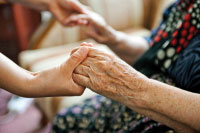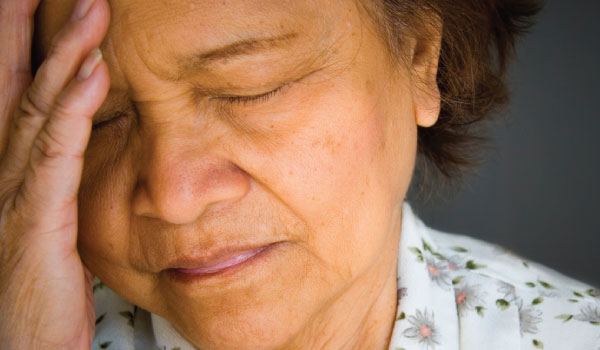Dementia in all its forms is one of the most pressing problems of the world. Woman This Month sits down with experts to find out the truth about the personality stealing disease.
 There is probably no more a dreaded illness associated with getting older than any type of dementia. Millions of people around the world suffer from this identity-destroying condition and the numbers keep on increasing year by year. Far too often we hear about cases where parents can’t even remember their children’s names or find their way back home from the neighbourhood store. The real question we try to tackle is, why is it caused and are we all really helpless in the hands of this mind-robbing horror?
There is probably no more a dreaded illness associated with getting older than any type of dementia. Millions of people around the world suffer from this identity-destroying condition and the numbers keep on increasing year by year. Far too often we hear about cases where parents can’t even remember their children’s names or find their way back home from the neighbourhood store. The real question we try to tackle is, why is it caused and are we all really helpless in the hands of this mind-robbing horror?
Dementia 101
Our expert: Dr Shahid Khan, internal medicine, American Mission Hospital
Dementia is not a disease in itself, but rather a general term used to describe a decline in mental ability. Any kind of damage in the brain cells interferes with the capacity of the brain to communicate with the rest of the body. When this line of communication breaks (because of old age or a disease) normal actions like thinking and feeling can be affected.
Symptoms vary depending on the cause or type of dementia. These include memory loss where the patient may forget his way back home or may forget names and places.
 Moodiness where the person cannot control their emotions can also be noticed sometimes. Communicative difficulties are usually sure signs that something is wrong and as the disease progresses, their ability to carry out everyday tasks diminishes. “Diagnosis requires a complete medical and neuropsychological evaluation. After a patient is brought in by their family, the doctor first needs to determine the severity of their cognitive problem,“ explains Dr Khan. A detailed history is taken while a physical examination is carried out along with a few mental status tests and laboratory exams. Among them is the Minnesota Mini-mental Status Examination where a multiple questionnaire test is given to the patient. The score of the questionnaire evaluates the cognitive deficit of the patient, ranging from mild to severe. “A Brain CT scan or MRI can help us in determining the cause, which could be a stroke for example. Knowing the cause allows us to recommend the right treatment plan,” he adds.
Moodiness where the person cannot control their emotions can also be noticed sometimes. Communicative difficulties are usually sure signs that something is wrong and as the disease progresses, their ability to carry out everyday tasks diminishes. “Diagnosis requires a complete medical and neuropsychological evaluation. After a patient is brought in by their family, the doctor first needs to determine the severity of their cognitive problem,“ explains Dr Khan. A detailed history is taken while a physical examination is carried out along with a few mental status tests and laboratory exams. Among them is the Minnesota Mini-mental Status Examination where a multiple questionnaire test is given to the patient. The score of the questionnaire evaluates the cognitive deficit of the patient, ranging from mild to severe. “A Brain CT scan or MRI can help us in determining the cause, which could be a stroke for example. Knowing the cause allows us to recommend the right treatment plan,” he adds.
Can it be treated?
Some medications can be used to help slow down the process but most treatments can neither reverse nor stop dementia. There are, however a few cases that are caused by medical conditions that can be treated. In these cases, most or full mental functionality can be restored. Thyroid disease or Vitamin B12 deficiency can be treatable if diagnosed in early stages. Alzheimer disease is one type of dementia that can be treated by some medications to only slow down the process and prolong a person’s brain control.
Alzheimer’s 101
Our expert: Qusai Al Haddad, specialist neurologist at Bahrain Specialist Hospital
 The most common form of dementia, Alzheimer’s disease (AD), increases with old age, but developing it is not a part of normal ageing. The exact cause of AD is yet to be clear. Studies show that genes and environmental factors seem to play a role.
The most common form of dementia, Alzheimer’s disease (AD), increases with old age, but developing it is not a part of normal ageing. The exact cause of AD is yet to be clear. Studies show that genes and environmental factors seem to play a role.
Risk factors, although not well proven, include having high blood pressure for a long time and a history of head trauma. Some studies even suggest that women are more likely to suffer from AD than men. Symptoms include difficulty with many areas of mental function like emotional behaviour or personality, language, memory, perception, thinking and judgment.
The early symptoms can include difficulty performing tasks that take some thought, but used to come easily, such as balancing a cheque book, playing complex board games or learning new information or routines.
“Getting lost on familiar routes and misplacing items as well as loss of social skills can be signs to look out for,” says Dr Qusai.
As AD worsens, symptoms become more obvious and interfere with a person’s ability to take care of themselves. This can then result in a change in sleep patterns, delusions, depression and even something as simple as preparing meals or choosing proper clothing to wear. In the most severe case, a person can no longer understand language or recognize family members.
Can it be prevented?
 Although some risk factors cannot be prevented, doctors continue to explore other factors that can help strengthen a person’s mental stability and functionality. There is no proven way to prevent AD, but there are some practices that may be worth incorporating into your daily routine, particularly if you have a family history of dementia. “Consuming a low-fat diet is the first step. Eat cold water fish like tuna, salmon, and mackerel rich in omega-3 fatty acids, at least two to three times per week,” the expert suggests.
Although some risk factors cannot be prevented, doctors continue to explore other factors that can help strengthen a person’s mental stability and functionality. There is no proven way to prevent AD, but there are some practices that may be worth incorporating into your daily routine, particularly if you have a family history of dementia. “Consuming a low-fat diet is the first step. Eat cold water fish like tuna, salmon, and mackerel rich in omega-3 fatty acids, at least two to three times per week,” the expert suggests.
Cutting out margarine, butter and dairy products as well as increasing antioxidants like carotenoids, vitamin E, and vitamin C can also help. Studies even show that staying mentally and socially active has also proven to lower the risk factors of AD and other types of dementia.
“Cardiovascular health is a major contributor to mental health. Anything that damages blood vessels can deprive your brain from oxygen and food. Implementing basic steps like maintaining your blood pressure, quitting smoking and regular screenings can go a long way,” he adds.
Get support
Our expert: Alzheimer’s Association, www.alz.org
Being a caregiver can be difficult, and sometimes, you can use all the help you can get. For those looking for 24-hour support, an online community can go a long way.
The Alzheimer’s Association is the leading, global voluntary health organisation in care and support. It is also the largest private, non-profit funder of research. Formed in 1980, the association advances research to end Alzheimer’s and dementia while enhancing care for those living with the disease.
With more than 4,500 support groups, the organisers try as much as possible to connect people across the globe through their message boards on their website. Another free tool is the ‘navigator’ option which can provide individuals with Alzheimer’s and their caregiver’s step-by-step guidance and customised action plans. If you are looking to support the cause, the association is the leading voice for Alzheimer’s disease advocacy, fighting for critical research, as well as prevention and care initiatives at every level. If you want to work to make the disease an international priority, then joining in the effort may not be as difficult as you might think. The donation section of the website has a variety of projects that could use your support.
Reduce risk:
- Get moving. Numerous studies show a link between physical activity and healthy memory. Studies have found that aerobics sharpen daily performance, improves brain function and reduces risk for memory impairment over our lifetime.
- Keep your mind busy. Intellectual stimulation, mental activities or even just furthering your education can play a great role in keeping your memory in check. Read a book, solve a crossword puzzle or learn something new. Whatever it is, make it a habit.
- A brain-boosting diet. Cut out saturated fat from your diet as much as you can and say yes to food rich in omega-3 fatty acids like fish and antioxidants like berries. Also, many studies suggest that coffee helps keep your brain active in your later years. Start taking a daily multivitamin to help slow ageing in your brain.





































